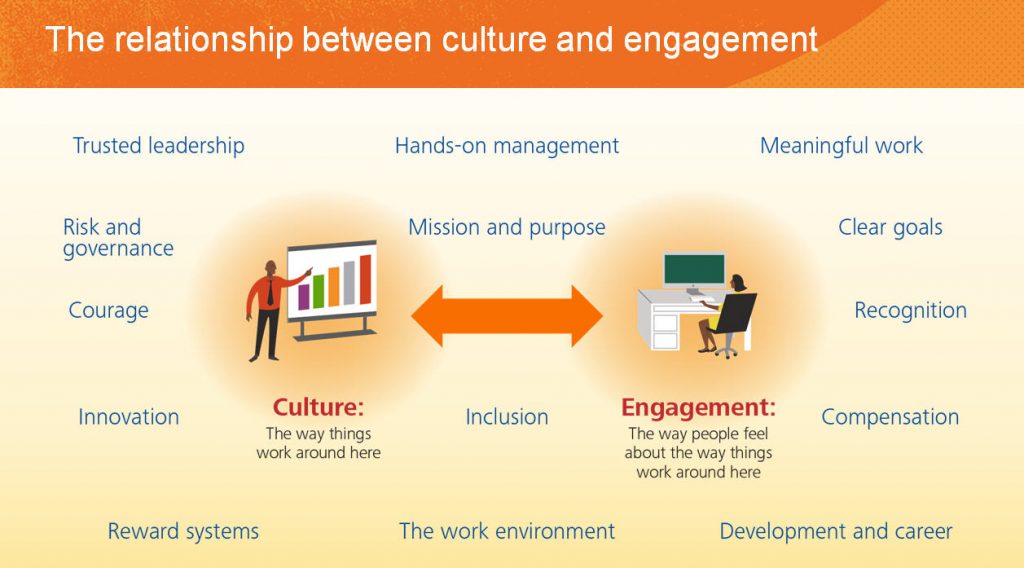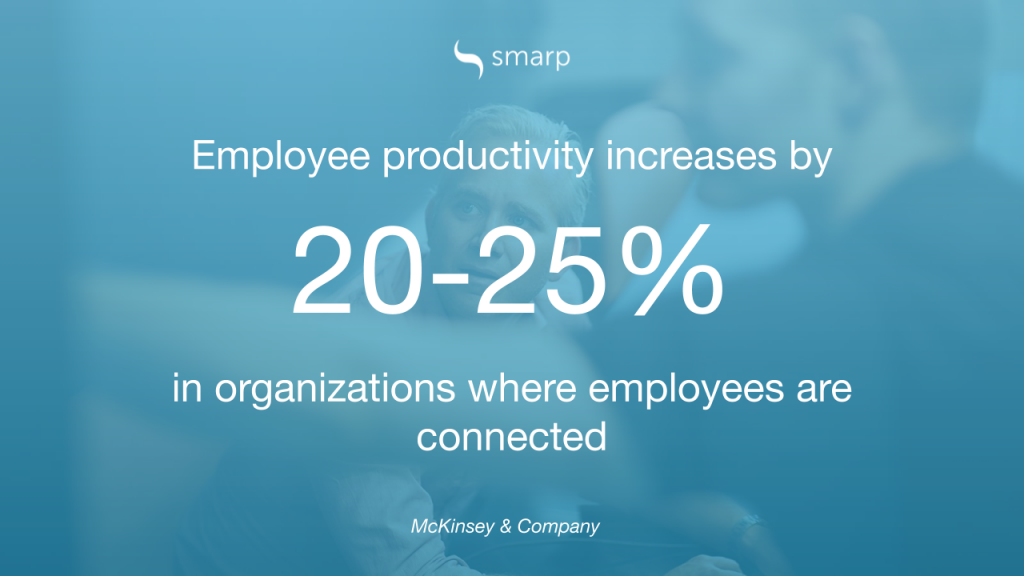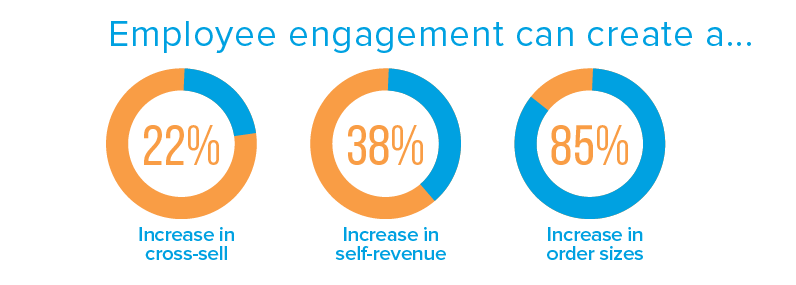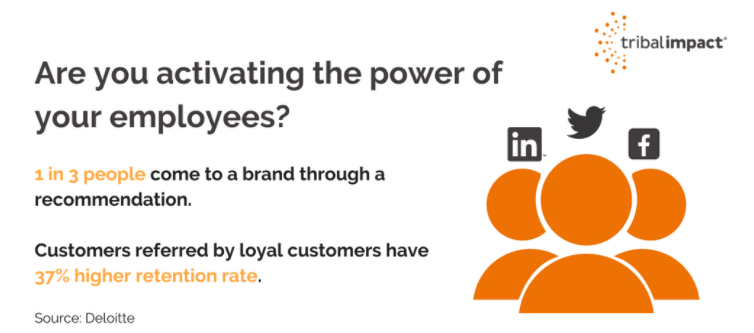Employee marketing, or internal marketing, is just as important as external marketing.
Treating your employees in the same manner as you treat your customers increases employee engagement, puts everyone on the same page, and aligns all areas of the business with its core values and goals.
It increases productivity, creates a better company culture, and improves customer service.
In this guide, we’re covering what employee marketing is, why employee marketing is important, and how to do it right in your business.
Let’s dive in!
In simple terms, employee marketing is the promotion of the brand’s core values, goals, and culture to its employees.
The objective of this is to create an emotional connection with the company and the brand, which leads to enthusiasm and improved employee engagement.
Internal employee communication and sharing information is very important for this, but it’s adding marketing tactics to the mix that makes the magic happen.
When employees are engaged and passionate about their company, they’re more motivated and productive.
That enthusiasm and positive sentiment towards the brand shines through in customer interactions and their official and unofficial employee advocacy on social media.
Check out this video by Gallup for a useful snapshot of why employee engagement is so important:
Having an engaged and motivated workforce also improves employee retention and makes hiring new talent much easier.
Treating your employees like customers and marketing the company to them, while sharing vital information and keeping everyone connected and engaged is at the heart of employee marketing.
Employee marketing has many benefits. One of the most important ones is increased employee engagement and the impacts of engagement on company culture, productivity, and customer experience.
Engaged employees do their jobs better, and they’re more in tune with the company’s objectives and values.
They can bring that awareness and passion into their interactions with customers, colleagues, and partners.
When employees have quick and easy access to the relevant information they need, they’re more efficient and effective, improving customer experience directly and indirectly.
Let’s look in more detail at how improved employee engagement benefits the company and brand:
Effective communication, that goes both ways between the company and its employees, is essential for getting the whole organization on the same page and pulling together towards the common good.
This can be a challenge, especially in larger organizations, because communication can’t be a one-size-fits-all memo.
To be effective, internal communication needs to borrow some marketing tactics!
Approaching internal communication in the same way you would approach communication with your customers helps you tailor communication to reach them best.
Looking at them as a ‘target audience,’ which needs to be engaged to properly process the message, changes the game completely.
When the message is delivered in a way that best reaches them and shows them how it applies to them, in their specific role, it is much more effective.

Employees who are aware of what is happening in their company on a broader level and are able to see their role in that bigger picture are more likely to feel like they’re a part of something meaningful.
Having your workforce, across all departments and sectors, feeling like they’re part of one community fosters a sense of belonging.
It makes working for that particular company meaningful and fulfilling. Employees are happier, more open, and more aware of the brand or company as a whole.
Employee engagement and productivity go hand in hand.
According to Forbes, “teams who score in the top 20% in engagement realize a 41% reduction in absenteeism and 59% less [employee] turnover. Engaged employees show up every day with passion, purpose, presence, and energy”.

The reason for this is surprisingly simple – when employees are well-informed, and they feel valued and heard at work, they are more productive.
Internal communication, optimized by marketing tactics, makes this possible!
Customer service, especially in customer-facing businesses, is the most important aspect to consider.
When employees are more engaged and feel personally connected to their company, they can better help customers.

Their passion and enthusiasm shine through in their interactions. And that sense of personal connection to the company makes them take ownership of their part in the customer experience.
Effective employee communication gives employees the tools they need to succeed at customer service.
They’re more efficient at finding solutions, and the other employees and departments needed to fulfill that solution are also better equipped to help them help the customer.
When all the different parts of the whole are working together and aligned in their approach and objectives, the customers receive the best service.
Passionate and enthusiastic employees who are well-informed and feel a part of the greater community make the best employee advocates.
Employee advocacy programs are one of the best ways to leverage social media for increased brand awareness, positive sentiment, and better sales.

Customers trust employees more than companies or high-level executives.
Social media posts from employees get up to 8 times more engagement than those shared from corporate accounts and the reach and engagement.
The collective reach of numerous employees on social media is exponentially greater than that of the company’s official social media accounts alone.
Engaged employees are naturally better ambassadors for their company and brand.
They’re more knowledgeable, and their authentic positive sentiment towards the company results in genuinely enthusiastic participation.
Employee marketing essentially takes employee communication and blends it with marketing for the best results.
As such, your internal communication needs to have a strategy with specific goals, a content plan, and metrics to measure success.
A central aspect of marketing is understanding the audience, presenting relevant messages to that audience, and measuring the outcome.
This allows for the campaign to be modified to improve the audience’s experience and to make a greater impact. This applies to employee marketing and communication, too.
To implement employee marketing successfully, you should incorporate some other marketing principles:
Effective communication is audience-specific. Just as in customer marketing you would develop a customer persona and market to that ‘ideal buyer’. The same applies to employees.
It is important to determine their different attributes, context and location, and role in the company.
Understanding who they are and how to effectively communicate with them is essential for supplying them with relevant information that helps them perform their specific role in the business.
Identifying the different groups in the workforce allows for communication to be segmented and targeted.
Here, it is important to consider the method of delivery, based on what forms of communication are available to different groups.
The most effective messages are those that resonate with the audience.
Personalized and contextualized messages are more relevant and interesting to the receiver because it applies to them personally.
This also helps the receiver to understand what they’re expected to do with the information they receive in the context of their role in the company.
Communication is useless if the receiver doesn’t know how to use that information properly to achieve the intended outcome.
Personalized messages answer the questions of ‘why am I being told this?’ and ‘what am I meant to do with this information?’ because they’re relevant to the receiver’s context and role.
Assessing the impact of your communication strategy can be tricky, especially when your goals are difficult to measure in concrete terms.
This is where feedback from employees makes all the difference.
Employee marketing shifts traditional employee communication towards an ongoing conversation, where information is moving both ways.
Gathering feedback regularly allows you to keep track of how your strategies are working, which methods work best for which groups, and how you can improve going forward.
It also allows you to measure the success of your campaign and progress toward your goals.
While these things can be difficult to quantify and track, there are software solutions to help you keep track of your metrics.
Many employee advocacy platforms can help you here, especially if you are also running an employee advocacy program.
Employee marketing requires a diverse skill set. Creating a team of people to plan, organize, and execute the process makes all the difference.
When assembling your team, you can emulate some of the roles found in a traditional marketing campaign:
Employee marketing is a blend of internal communication and marketing.
It involves treating your employees the same way you treat your customers and developing great relationships.
Employee marketing is important for several reasons and has great benefits, like improved employee engagement, employee retention, better productivity, and developing a great company culture.
It also makes for a great customer service experience and boosts sales and customer retention.
In a digital age, employee communication is the key to keeping employees connected and aligned with the company’s values and mission, and pulling together for the good of the greater community.
If you haven’t started getting your employee marketing program, now is the time!
Beekeeper Blog: 3 Reasons Why Internal Marketing Communication Is Imperative
Dynamic Signal: Business Success Depends on If Employees Can Hear You
Forbes: 10 Timely Statistics About The Connection Between Employee Engagement and Wellness
Harvard Business Review: Selling the Brand Inside
In simple terms, employee marketing is the promotion of the brand’s core values, vision and mission, goals, and culture to employees. The aim is to create an emotional connection with the company and the brand, which leads to enthusiasm and improved employee engagement. Check out the full guide to learn more about employee marketing.
Employee marketing is employee communication, using marketing tactics. Adding marketing tactics to employee communication improves the efficacy of communication and improves employee engagement. Check out the full guide for mote info on how employee marketing utilizes marketing techniques in internal communication.
The benefits of employee marketing include improved employee engagement, greater productivity, better customer service and improved brand awareness. Read the full guide to learn more about the benefits of employee marketing.